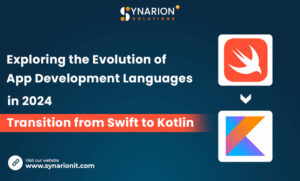Exploring the Evolution of App Development Languages in 2024
Introduction
In the dynamic realm of mobile app development, the choice of programming language plays a pivotal role in shaping the efficiency, scalability, and user experience of applications. As technology continues to evolve, developers are constantly exploring new languages and frameworks to stay abreast of emerging trends and cater to evolving user demands. In this comprehensive exploration, we delve into the evolution of app development languages, particularly the transition from Swift to Kotlin, and its implications for developers and businesses in 2024.
Swift: The Evolution of iOS Development
Swift, introduced by Apple in 2014, has quickly become the go-to programming language for iOS and macOS app development. Built with modern syntax and powerful features, Swift offers developers a more streamlined and efficient alternative to Objective-C, the previous standard for iOS development. Since its inception, Swift has undergone significant enhancements and updates, solidifying its position as a leading language for building high-performance, secure, and scalable iOS applications.
Key Features of Swift
Safety and Performance
Swift is designed with safety and performance in mind, offering features such as optionals, type inference, and memory management mechanisms that help developers write cleaner, more reliable code. By eliminating common programming errors and reducing the risk of runtime crashes, Swift enhances the overall stability and performance of iOS applications.
Interoperability
Swift seamlessly interoperates with Objective-C code, allowing developers to leverage existing libraries, frameworks, and tools within their Swift projects. This interoperability simplifies the transition from Objective-C to Swift, enabling developers to adopt Swift gradually while maintaining compatibility with legacy codebases.
Open-Source Community
First of all, Swift is an open-source language supported by a vibrant community of developers, contributors, and enthusiasts. Additionally, the open-source nature of Swift encourages collaboration, innovation, and knowledge sharing, leading to the development of a rich ecosystem of libraries, frameworks, and resources for iOS development.
SwiftUI
Introduced in Swift 5, SwiftUI is a declarative UI framework that enables developers to build dynamic and interactive user interfaces using simple and intuitive syntax. SwiftUI simplifies the process of UI development, offering features such as live previews, automatic layout adjustments, and seamless integration with Xcode.
Kotlin: The Rise of Cross-Platform Development
Kotlin, developed by JetBrains, made its debut in 2011 as a statically typed programming language for the Java Virtual Machine (JVM). While initially targeted at backend and server-side development, Kotlin gained widespread adoption in the Android community following its official endorsement by Google as a first-class language for Android app development in 2017. Since then, Kotlin has emerged as a versatile and pragmatic choice for building Android applications, offering a modern, concise, and expressive syntax that enhances developer productivity and code maintainability.
Key Features of Kotlin
Interoperability with Java
Kotlin seamlessly interoperates with existing Java code, libraries, and frameworks, allowing developers to leverage their Java expertise and investments in Android development. Kotlin’s interoperability with Java enables developers to adopt Kotlin incrementally and migrate existing projects to Kotlin at their own pace.
Concise Syntax
Kotlin features a concise and expressive syntax that reduces boilerplate code and enhances readability. With features such as type inference, data classes, and extension functions, Kotlin enables developers to write more expressive and maintainable code, leading to improved productivity and code quality.
Coroutines
Kotlin introduces coroutines, a lightweight concurrency framework that simplifies asynchronous programming and asynchronous I/O operations on Android. Coroutines provides a structured and sequential approach to asynchronous programming, enabling developers to write asynchronous code that is easier to understand, debug, and maintain.
Multiplatform Development
Kotlin offers support for multiplatform development, allowing developers to share code between different platforms, including Android, iOS, and the web. With Kotlin Multiplatform, developers can write shared business logic, data models, and networking code that can be reused across multiple platforms, reducing development time and effort.
The Impact on the Industry: Choosing the Right Mobile App Development Company
As Swift and Kotlin continue to gain traction in the mobile app development landscape, businesses must carefully evaluate their choice of development languages and platforms when embarking on app development projects. Partnering with a reputable Mobile App Development Company that specializes in Swift and Kotlin development is essential for ensuring the success and competitiveness of your mobile applications.
A skilled Mobile App Development Company will possess extensive experience and expertise in Swift and Kotlin development, enabling them to deliver high-quality, feature-rich mobile applications that meet your business requirements and objectives. Whether you’re targeting the iOS or Android platform, partnering with a knowledgeable and experienced development team will ensure that your mobile app stands out in the crowded app market and delivers an exceptional user experience.
Conclusion
The evolution of Swift and Kotlin as primary app development languages in 2024 reflects the ongoing innovation and advancement in the field of mobile app development. Additionally, by embracing these modern languages and leveraging their unique features and capabilities, businesses can unlock new opportunities for growth, differentiation, and success in the competitive mobile app market.




